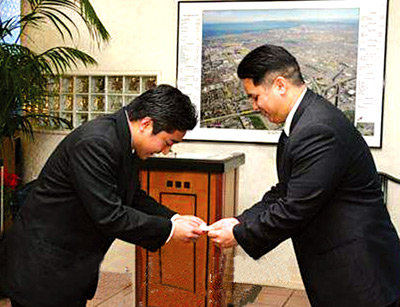When profligate profanity tests your patience
Gaston de Rosayro
 Most parents are delighted and proud when their little boy politely
says “please,” “thank you,” and “excuse me.” Parents are a bit less
delighted when the preschool years pass and children seem to shed their
manners along with their diapers. If you believe that manners and common
courtesy are important, be sure you continue to model and teach them in
your family. Your son will make his own decisions about whether to
practice courtesy on his own, but he is far more likely to do so if you
show him how. Most parents are delighted and proud when their little boy politely
says “please,” “thank you,” and “excuse me.” Parents are a bit less
delighted when the preschool years pass and children seem to shed their
manners along with their diapers. If you believe that manners and common
courtesy are important, be sure you continue to model and teach them in
your family. Your son will make his own decisions about whether to
practice courtesy on his own, but he is far more likely to do so if you
show him how.
|

Respecting each other |
Profanity is sometimes a challenge for parents of boys, especially
during the teen years. Cursing and rough language, such as other risky
behaviour, may be viewed by boys as a trait of masculinity. Boys feel
manly and sophisticated when they let loose with a barrage of
four-letter words. You might tell your son that you know he may curse
with his friends, but that you would prefer not to hear that language.
And more importantly that you do not want him speaking that way to
teachers or other adults. This lesson will be much easier to teach, of
course, if you refrain from using profanity yourself.
If you spend much time around groups of young people, you may notice
that behaviour and manners have changed quite a bit from the time you
were young. Language is rougher these days, while many teens are
courteous and kind, others no longer offer routine respect to their
elders. Adults often comment that they would never have dared behave the
way their children do, but then, times have changed. Or have they?
Manners, including those pertaining to profanity are an important
part of life. The quality of manners you use are often a barometer of
your own character and morals.
How you talk to people and the words you use in expressing yourself
say a great deal about you. What is really in your heart is what gets
expressed.
When you have manners, you talk and interact with others
respectfully. You know how to talk with people in the most appropriate
manner. You know the proper way to address people, how to ask for
things, how to ask questions in a non-offensive manner and how to
express yourself in polite terms. When respect is mutual, you and the
person you are talking to respect each other and validate their value.
When you introduce profanity to the interaction, everything changes.
Either you or the person you are talking to feels violated and sullied.
Rather than feeling respected and validated, you feel dirtier than when
you started. Profanity has a way of making you feel trashed.
A profanity consists of ‘pro’ and ‘fanus’. The two words together
literally mean ‘out of the temple.’The term referred to when you showed
irreverence toward sacred objects. An example of this would be taking
the name of God in vain. The definition expanded over time to include
abusing holy things, polluting holy things, having contempt for holy
things or swearing in an unholy manner. Eventually the term was used
most often for the polluting of people through curses or references to
unclean objects.
|

Interacting with others |
You may want to dismiss or pass off as the profanities as a
‘cultural’ thing. Some regions and areas are so filled with profanity,
that they no longer elicit any reaction from their use. When the
profanity infects the whole culture, they show that they are
desensitized to profanities. The old term for such desensitization was ‘profligate.’The
term ‘profligate’ describes situations when there has been a loss of
decency and virtue.
You may even say that the vulgarity you uttered is not ‘really you’.
No matter how much you dismiss it, you said it. Not only did that come
out of your mouth, It reveals what was in your heart. The truth that
what you speak reveals what is in your heart is an old truth. What you
said is ‘really’ what you meant. Even with the little slips reveal what
your true feelings are.
Over the years, I have learned what each of the profanities is
communicating. In some cases, you may not have the vocabulary that
expresses what you are struggling with. Somehow resorting to profanity
allows you to convey in a powerful way what you want to say. Since
occasional profanity does have a shock value, such words do add some
power to your message.
Using them with frequency diminishes whatever power they once had.
Like dresses and ties that are worn too often, they lose their potency.
When others become familiar with your profanity, there is no longer any
shock value to it. As the power of the shock value diminishes, you may
consider increasing the frequency of the profanity. By repeating the
profanity, there is some shock, yet even that approach has diminishing
impact.
Knowing and practicing good manners are an important social skill.
Good manners consist in knowing how to speak to others in a respectful
manner. Rather than inundating yourself with profanities as a method of
self-expression, which often leaves you feeling dirty, manners give you
a sense of value.
Manners do not prevent the use of profanities. There are still times
and places where using profanity may be the best option. Manners provide
the structure to know when such situations arise. Knowing when to use
respectful language along with who to use it with is a part of manners.
Knowing the proper times and place where vulgar or profane talk is also
a part of manners as well.
There are also times when you may find yourself dealing with a
segment of people that only respond to profanity. They often only take
you serious when you let loose some profanity. With this population,
they view mannerly behaviour as being weak, and often ignore any kind of
civilized interaction.
When you are dealing with what I term ‘uncivilized’ persons,
profanity may be the only way to get their attention. I use the term
‘uncivilized’ since they do not respond to civil discourse.
They do not appreciate civility and often operate on a ‘might makes
right’ approach to life, taking advantage of those they presume are
weaker than they are. I would use the term ‘bully’ but some bullies are
civilized and respond to mannerly responses.
The ‘uncivilized’ form of bully only responds to power, force and
strength. In their world, only profane words have any meaning or force
behind them.
These kind of persons often try your patience. Courtesy Corner does
not recommend swearing in any form. But with such people and in such a
polluted environment there are times when you will be constrained to
return fire with a barrage of creative expletives that will make them
shut the @#$&up for good. Next week: Handling a foul mouthed boss.
[email protected]
|





